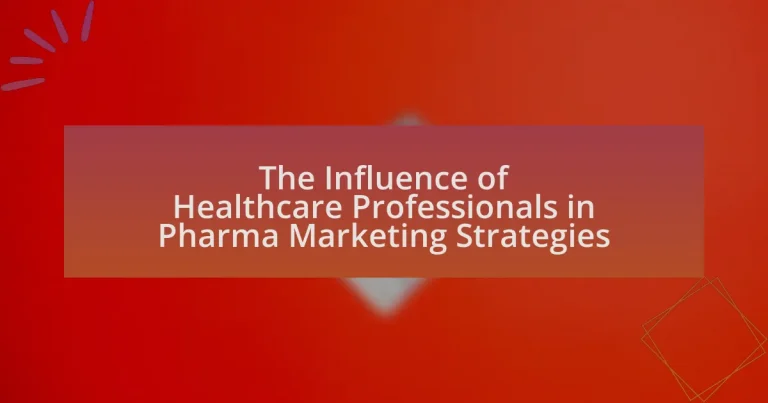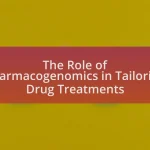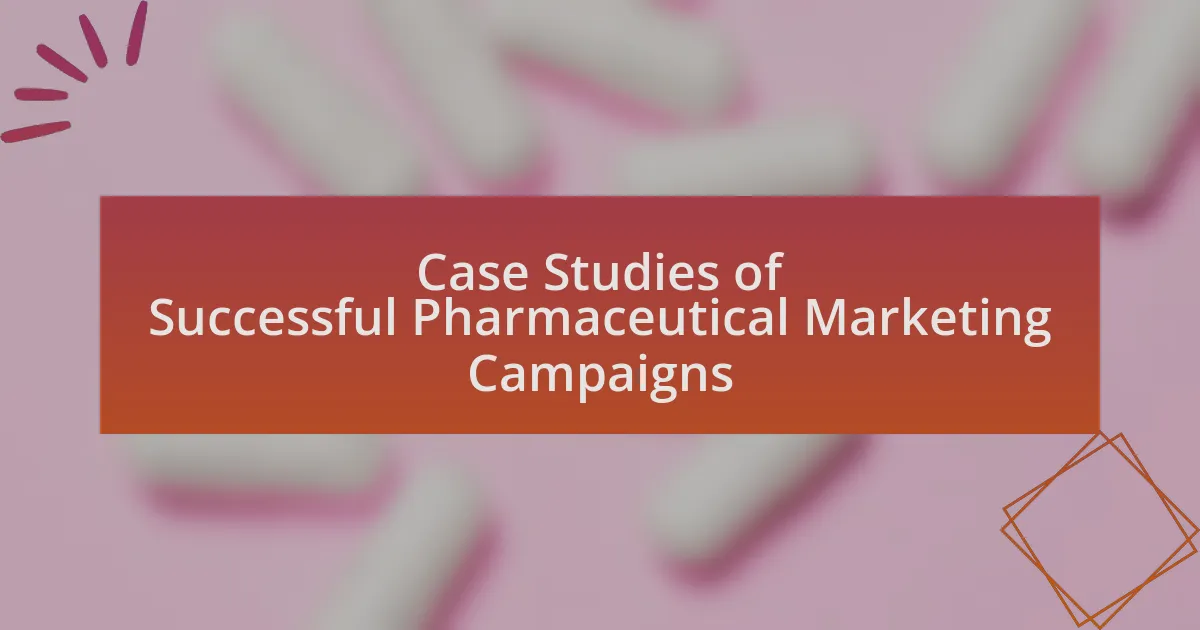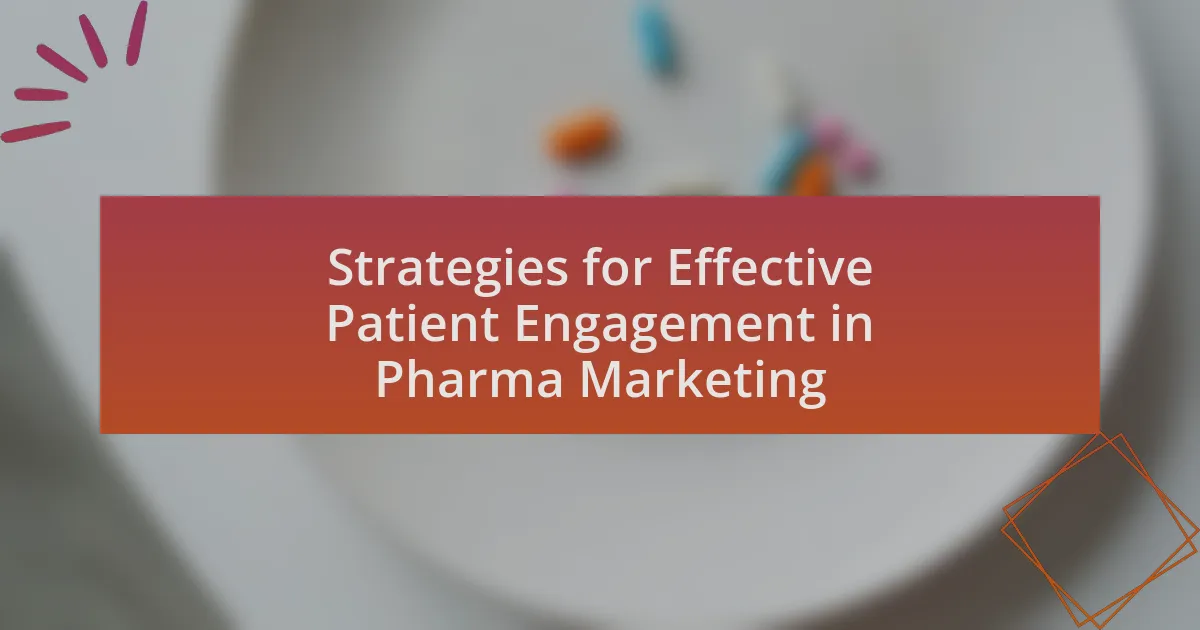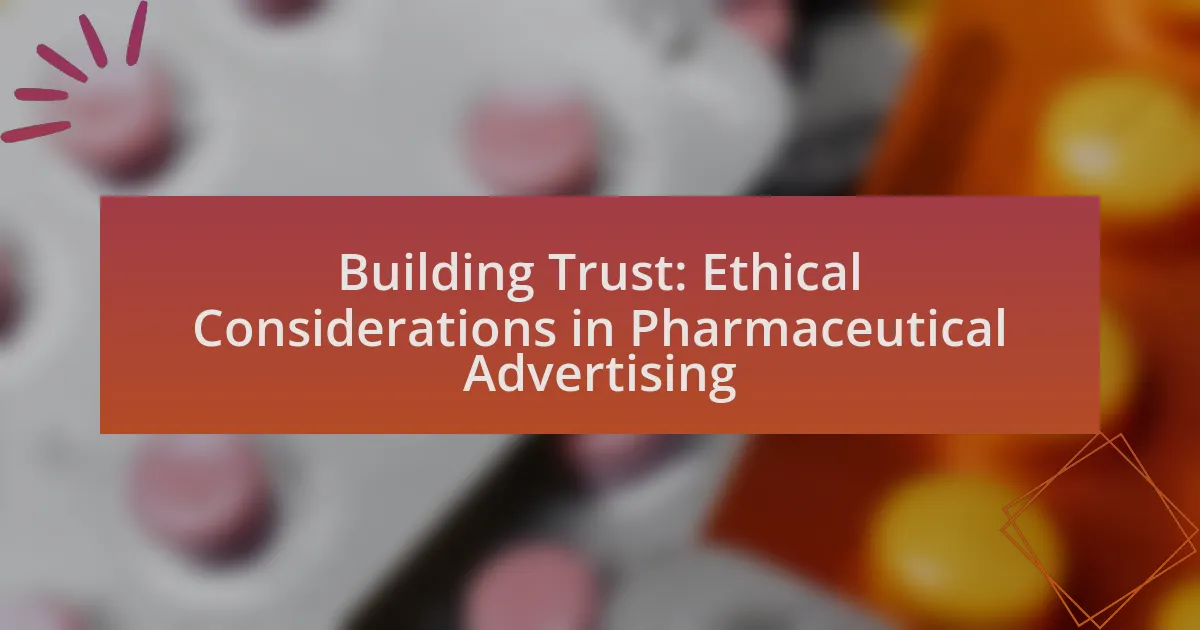Healthcare professionals play a pivotal role in shaping pharmaceutical marketing strategies by serving as trusted sources of information for patients and other healthcare providers. Their endorsements significantly enhance the credibility of pharmaceutical products, influencing patient perceptions and prescribing behaviors. The article explores how healthcare professionals impact marketing efforts, the benefits pharmaceutical companies gain from their involvement, and the ethical considerations surrounding these collaborations. Additionally, it addresses the challenges faced by healthcare professionals in navigating regulatory constraints while maintaining ethical standards in marketing practices. Overall, the article highlights the essential contributions of healthcare professionals to effective pharmaceutical marketing and patient care.
What is the Influence of Healthcare Professionals in Pharma Marketing Strategies?
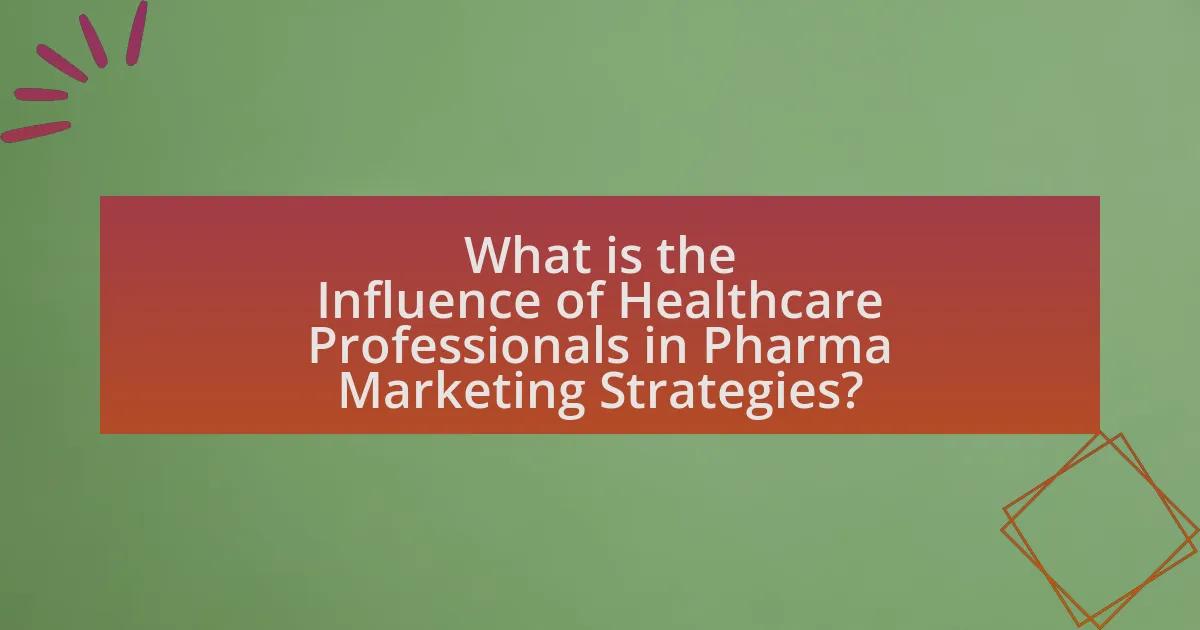
Healthcare professionals significantly influence pharma marketing strategies by acting as trusted sources of information for patients and other healthcare providers. Their endorsements and recommendations can enhance the credibility of pharmaceutical products, leading to increased adoption and sales. Research indicates that 72% of patients trust their healthcare providers’ opinions on medications, which underscores the importance of these professionals in shaping public perception and behavior regarding pharmaceutical products. Additionally, healthcare professionals often participate in clinical trials and provide valuable insights that can guide marketing approaches, ensuring that campaigns resonate with both medical and patient audiences.
How do healthcare professionals impact pharmaceutical marketing efforts?
Healthcare professionals significantly influence pharmaceutical marketing efforts by serving as trusted sources of information for patients and other healthcare providers. Their endorsements and recommendations can enhance the credibility of pharmaceutical products, leading to increased adoption and sales. Research indicates that 70% of patients trust their healthcare providers’ opinions on medications, which underscores the importance of these professionals in shaping public perception and acceptance of pharmaceutical brands. Additionally, healthcare professionals often participate in clinical trials and provide feedback that can guide marketing strategies, ensuring that promotional materials align with clinical evidence and patient needs.
What roles do healthcare professionals play in shaping marketing strategies?
Healthcare professionals play a crucial role in shaping marketing strategies by providing insights into patient needs and clinical practices. Their expertise helps pharmaceutical companies tailor their messaging and product offerings to align with real-world applications and patient outcomes. For instance, healthcare professionals often participate in advisory boards, where they share their experiences and feedback on products, influencing marketing approaches. Additionally, their endorsement can enhance credibility and trust in marketing campaigns, as studies show that healthcare provider recommendations significantly impact patient decisions regarding medications.
How do healthcare professionals influence consumer perceptions of pharmaceutical products?
Healthcare professionals significantly influence consumer perceptions of pharmaceutical products through their recommendations and trustworthiness. Their expertise and authority in medical matters lead consumers to rely on their opinions when making decisions about medications. Research indicates that 77% of patients trust their healthcare providers’ advice over other sources, such as advertisements or online information. This trust is further reinforced by the professional relationships that healthcare providers build with patients, which often include personalized discussions about treatment options. Consequently, when healthcare professionals endorse specific pharmaceutical products, it can enhance the perceived credibility and desirability of those products among consumers.
Why is the involvement of healthcare professionals crucial in pharma marketing?
The involvement of healthcare professionals is crucial in pharma marketing because they enhance credibility and trust in pharmaceutical products. Healthcare professionals possess specialized knowledge and expertise, which allows them to provide informed opinions and recommendations about medications. Their endorsement can significantly influence prescribing behaviors, as studies show that physicians are more likely to trust and prescribe medications that are supported by their peers. For instance, a survey by the American Medical Association found that 76% of physicians consider peer recommendations as a key factor in their prescribing decisions. This highlights the importance of healthcare professionals in bridging the gap between pharmaceutical companies and patients, ultimately leading to better patient outcomes and adherence to treatment regimens.
What benefits do pharmaceutical companies gain from engaging healthcare professionals?
Pharmaceutical companies gain several benefits from engaging healthcare professionals, primarily enhanced credibility and improved product adoption. By collaborating with healthcare professionals, pharmaceutical companies can leverage their expertise and trust within the medical community, which can lead to increased acceptance of their products among patients and other healthcare providers. Research indicates that 75% of physicians consider information from their peers as highly credible, making healthcare professionals pivotal in influencing prescribing behaviors. Additionally, engaging healthcare professionals allows pharmaceutical companies to gather valuable insights on clinical needs and treatment gaps, enabling them to tailor their products and marketing strategies effectively.
How does healthcare professional endorsement affect drug sales?
Healthcare professional endorsement significantly boosts drug sales by enhancing credibility and trust among consumers. When healthcare professionals, such as doctors or pharmacists, endorse a medication, their authority and expertise can influence patient perceptions and decisions, leading to increased prescriptions and purchases. Research indicates that endorsements can lead to a 20-30% increase in sales for promoted drugs, as patients often rely on the recommendations of trusted professionals over traditional advertising. This effect is particularly pronounced in therapeutic areas where patients seek reassurance about treatment efficacy and safety.
What are the key strategies used by healthcare professionals in pharma marketing?

Healthcare professionals utilize several key strategies in pharma marketing, including relationship building, education, and evidence-based promotion. Relationship building involves establishing trust and rapport with healthcare providers to facilitate communication and collaboration. Education focuses on providing accurate and relevant information about pharmaceutical products, ensuring that healthcare professionals are well-informed to make prescribing decisions. Evidence-based promotion emphasizes the use of clinical data and research findings to support product claims, enhancing credibility and fostering informed discussions. These strategies are essential for effective engagement and influence in the pharmaceutical marketing landscape.
How do healthcare professionals contribute to the development of marketing content?
Healthcare professionals contribute to the development of marketing content by providing expert insights and clinical perspectives that enhance the credibility and relevance of the material. Their involvement ensures that the content is scientifically accurate and aligned with current medical practices, which is crucial for building trust with both healthcare providers and patients. For instance, studies have shown that marketing materials co-created with healthcare professionals are perceived as more trustworthy, leading to higher engagement rates among target audiences. This collaboration often includes reviewing promotional materials, offering feedback on messaging, and sharing real-world experiences that inform the content strategy.
What types of content do healthcare professionals create for pharma marketing?
Healthcare professionals create various types of content for pharma marketing, including educational articles, clinical research summaries, case studies, and patient testimonials. These content types serve to inform both healthcare providers and patients about new treatments, drug efficacy, and safety profiles. For instance, educational articles often highlight the latest advancements in medical research, while clinical research summaries provide insights into trial results, enhancing the credibility of pharmaceutical products. Additionally, case studies illustrate real-world applications of medications, and patient testimonials can humanize the marketing message, making it more relatable. This multifaceted approach leverages the expertise of healthcare professionals to build trust and authority in pharmaceutical marketing.
How does the credibility of healthcare professionals enhance marketing messages?
The credibility of healthcare professionals significantly enhances marketing messages by increasing trust and perceived value among consumers. When healthcare professionals endorse a product or service, their expertise and authority lend legitimacy to the marketing claims, making consumers more likely to believe in the efficacy and safety of the product. Research indicates that 75% of patients trust their healthcare providers’ recommendations, which underscores the impact of professional credibility on consumer decision-making. This trust can lead to higher engagement rates and improved brand loyalty, ultimately driving sales and market share for pharmaceutical companies.
What methods do pharmaceutical companies use to collaborate with healthcare professionals?
Pharmaceutical companies collaborate with healthcare professionals through various methods, including sponsored research, continuing medical education (CME) programs, advisory boards, and direct marketing initiatives. Sponsored research allows pharmaceutical companies to fund studies that can lead to new treatments, while CME programs provide healthcare professionals with updated knowledge on medical advancements, often funded by pharmaceutical firms. Advisory boards consist of healthcare professionals who provide insights on drug development and marketing strategies, ensuring that the pharmaceutical companies align their products with clinical needs. Additionally, direct marketing initiatives, such as promotional materials and samples, facilitate communication between pharmaceutical companies and healthcare professionals, enhancing product awareness and usage. These methods are essential for fostering relationships that can influence prescribing behaviors and improve patient outcomes.
How do pharmaceutical companies identify and select healthcare professionals for partnerships?
Pharmaceutical companies identify and select healthcare professionals for partnerships through a systematic approach that includes evaluating professional credentials, expertise, and influence within their respective fields. Companies often utilize data analytics to assess healthcare professionals’ prescribing patterns, patient interactions, and engagement in clinical research, which helps in identifying key opinion leaders. Additionally, companies may conduct surveys and interviews to gauge the professionals’ interest in collaboration and their alignment with the company’s therapeutic areas. This method ensures that selected healthcare professionals can effectively contribute to the company’s marketing strategies and enhance product visibility.
What are the ethical considerations in these collaborations?
Ethical considerations in collaborations between healthcare professionals and pharmaceutical companies include transparency, conflicts of interest, and the potential for undue influence on clinical practices. Transparency is crucial, as healthcare professionals must disclose any financial relationships with pharmaceutical companies to maintain trust with patients and the public. Conflicts of interest arise when healthcare professionals’ financial incentives may compromise their objectivity in prescribing medications or recommending treatments. Research published in the Journal of Medical Ethics highlights that such collaborations can lead to biased clinical decision-making, ultimately affecting patient care. Additionally, the potential for undue influence is significant, as pharmaceutical marketing strategies may exploit the authority of healthcare professionals to promote products, which raises concerns about the integrity of medical advice provided to patients.
What challenges do healthcare professionals face in pharma marketing strategies?

Healthcare professionals face several challenges in pharma marketing strategies, primarily due to regulatory constraints, ethical considerations, and the need for accurate information dissemination. Regulatory constraints, such as the FDA’s guidelines on pharmaceutical advertising, limit how healthcare professionals can engage with marketing materials, often requiring them to navigate complex compliance issues. Ethical considerations arise from the potential conflicts of interest when promoting pharmaceutical products, as healthcare professionals must balance their duty to patients with the interests of pharmaceutical companies. Additionally, the need for accurate information dissemination is critical, as healthcare professionals must ensure that the marketing messages align with scientific evidence and clinical guidelines, which can be challenging in a rapidly evolving pharmaceutical landscape.
How do regulatory constraints impact healthcare professionals’ involvement in marketing?
Regulatory constraints significantly limit healthcare professionals’ involvement in marketing by imposing strict guidelines on advertising practices and communication with patients. These regulations, such as the Health Insurance Portability and Accountability Act (HIPAA) in the United States, restrict the sharing of patient information and require transparency in promotional activities. Consequently, healthcare professionals must navigate these legal frameworks carefully to avoid penalties, which often results in reduced engagement in marketing initiatives. For instance, a study published in the Journal of Medical Marketing highlights that compliance with regulatory standards can lead to a cautious approach in marketing strategies, ultimately affecting the effectiveness of promotional efforts in the pharmaceutical industry.
What specific regulations must healthcare professionals adhere to in pharma marketing?
Healthcare professionals must adhere to regulations such as the Food, Drug, and Cosmetic Act, the Anti-Kickback Statute, and the Physician Payments Sunshine Act in pharma marketing. These regulations ensure that marketing practices are ethical and transparent. The Food, Drug, and Cosmetic Act mandates that all promotional materials must be truthful and not misleading, while the Anti-Kickback Statute prohibits any form of remuneration for referrals or recommendations of pharmaceutical products. The Physician Payments Sunshine Act requires disclosure of any payments or transfers of value made to healthcare professionals by pharmaceutical companies, promoting transparency in financial relationships.
How do these regulations affect the effectiveness of marketing strategies?
Regulations significantly impact the effectiveness of marketing strategies in the pharmaceutical industry by imposing restrictions on how products can be promoted to healthcare professionals. These regulations, such as the Physician Payments Sunshine Act, require transparency in financial relationships between pharmaceutical companies and healthcare providers, which can limit the ability of marketers to engage in traditional promotional tactics. For instance, a study published in the Journal of Health Economics found that increased regulatory scrutiny led to a 20% reduction in promotional spending by pharmaceutical companies, indicating that compliance costs and restrictions can diminish the overall effectiveness of marketing efforts.
What ethical dilemmas arise for healthcare professionals in pharma marketing?
Healthcare professionals face several ethical dilemmas in pharma marketing, primarily related to conflicts of interest, patient welfare, and the integrity of medical information. Conflicts of interest arise when healthcare professionals receive incentives from pharmaceutical companies, which may compromise their objectivity in prescribing medications. For instance, studies have shown that physicians who accept gifts or payments from pharmaceutical companies are more likely to prescribe those companies’ products, potentially prioritizing profit over patient care.
Additionally, healthcare professionals must navigate the ethical obligation to provide unbiased, evidence-based information to patients while being influenced by marketing tactics that may exaggerate the benefits or downplay the risks of medications. This dilemma is compounded by the pressure to meet sales targets or maintain relationships with pharmaceutical representatives, which can lead to the dissemination of misleading information.
Moreover, the ethical principle of informed consent is challenged when marketing practices obscure the true nature of a drug’s efficacy or safety profile, ultimately affecting patient autonomy and decision-making. These dilemmas highlight the need for stringent ethical guidelines and transparency in the interactions between healthcare professionals and the pharmaceutical industry.
How can healthcare professionals balance their responsibilities to patients and marketing roles?
Healthcare professionals can balance their responsibilities to patients and marketing roles by prioritizing patient care while engaging in ethical marketing practices. This involves maintaining transparency about the products they promote and ensuring that their marketing efforts do not compromise patient trust or care quality. Research indicates that healthcare professionals who adhere to ethical guidelines in marketing can enhance patient outcomes and satisfaction, as seen in studies published in the Journal of Medical Marketing, which highlight the positive correlation between ethical marketing and patient trust. By integrating patient-centered approaches into their marketing strategies, healthcare professionals can effectively fulfill both roles without conflict.
What strategies can healthcare professionals use to maintain ethical standards in marketing?
Healthcare professionals can maintain ethical standards in marketing by adhering to transparency, evidence-based claims, and patient-centered communication. Transparency involves disclosing any potential conflicts of interest, such as financial relationships with pharmaceutical companies, which fosters trust and accountability. Evidence-based claims ensure that all marketing materials are supported by credible research and clinical data, preventing the dissemination of misleading information. Patient-centered communication focuses on the needs and well-being of patients, prioritizing their health outcomes over profit motives. These strategies align with ethical guidelines established by organizations like the American Medical Association, which emphasizes the importance of integrity and honesty in healthcare marketing practices.
What best practices should healthcare professionals follow in pharma marketing?
Healthcare professionals should prioritize ethical communication and transparency in pharma marketing. This involves providing accurate information about medications, avoiding misleading claims, and ensuring that promotional materials are based on scientific evidence. For instance, adherence to guidelines set by organizations like the American Medical Association emphasizes the importance of integrity in marketing practices. Additionally, healthcare professionals should engage in continuous education to stay informed about the latest developments in pharmaceuticals, which enhances their ability to make informed recommendations to patients. Following these best practices not only fosters trust with patients but also aligns with regulatory standards, ultimately contributing to better healthcare outcomes.
How can healthcare professionals effectively communicate with patients about pharmaceutical products?
Healthcare professionals can effectively communicate with patients about pharmaceutical products by using clear, jargon-free language and actively engaging patients in discussions about their treatment options. This approach fosters understanding and encourages patients to ask questions, which enhances their knowledge and comfort level regarding the medications prescribed. Research indicates that effective communication improves patient adherence to medication regimens, as evidenced by a study published in the Journal of the American Medical Association, which found that patients who received clear explanations about their medications were 30% more likely to follow their prescribed treatment plans.
What role does transparency play in the relationship between healthcare professionals and pharma marketing?
Transparency fosters trust in the relationship between healthcare professionals and pharma marketing. When pharmaceutical companies openly disclose information about their products, clinical trials, and marketing practices, healthcare professionals can make informed decisions that prioritize patient welfare. For instance, studies have shown that transparency in drug pricing and efficacy can lead to better prescribing practices, as healthcare professionals are more likely to trust and recommend medications that are backed by clear, accessible data. This trust is essential for effective collaboration, as it encourages healthcare professionals to engage with pharma marketing initiatives that align with ethical standards and patient care objectives.
